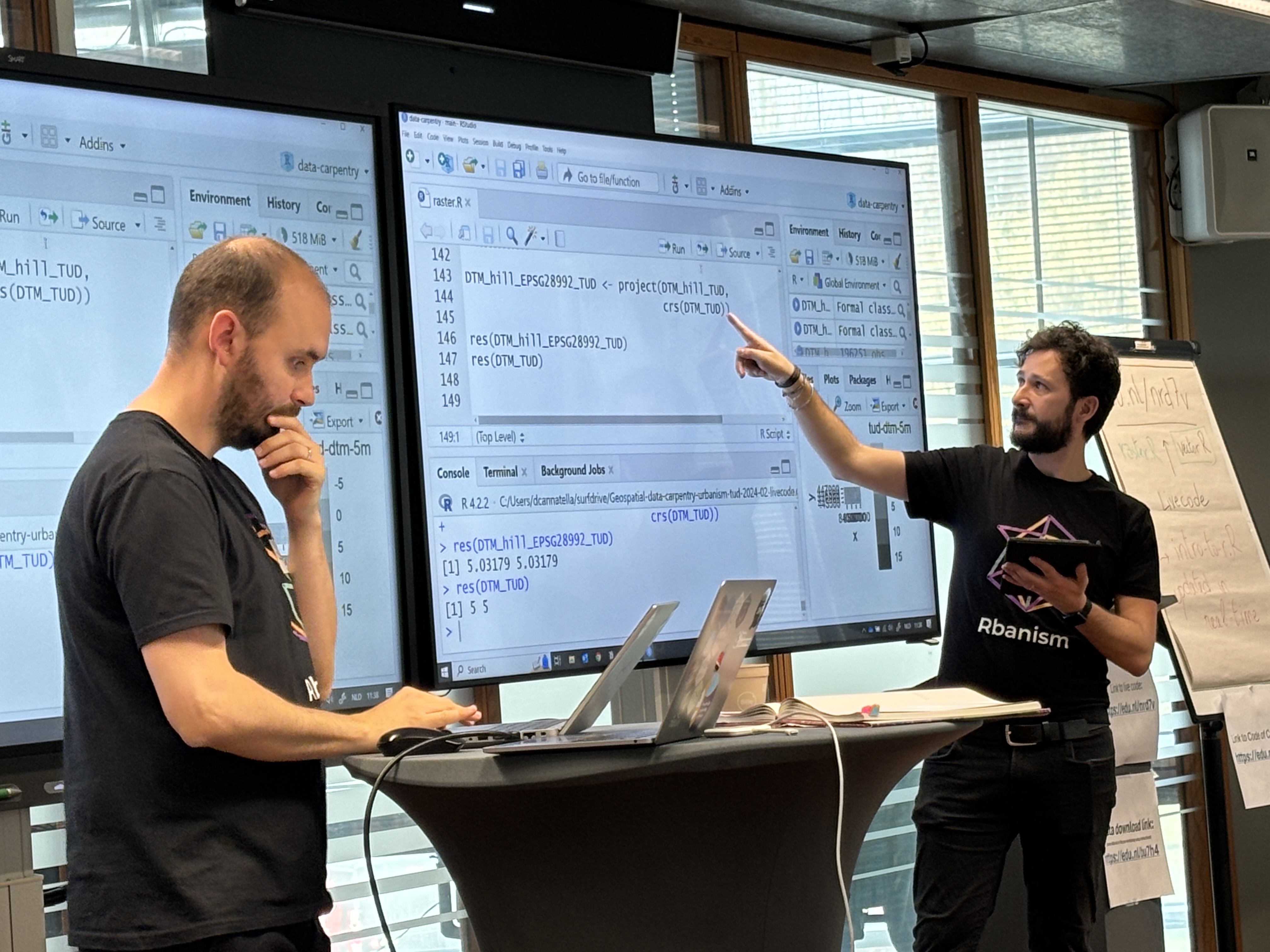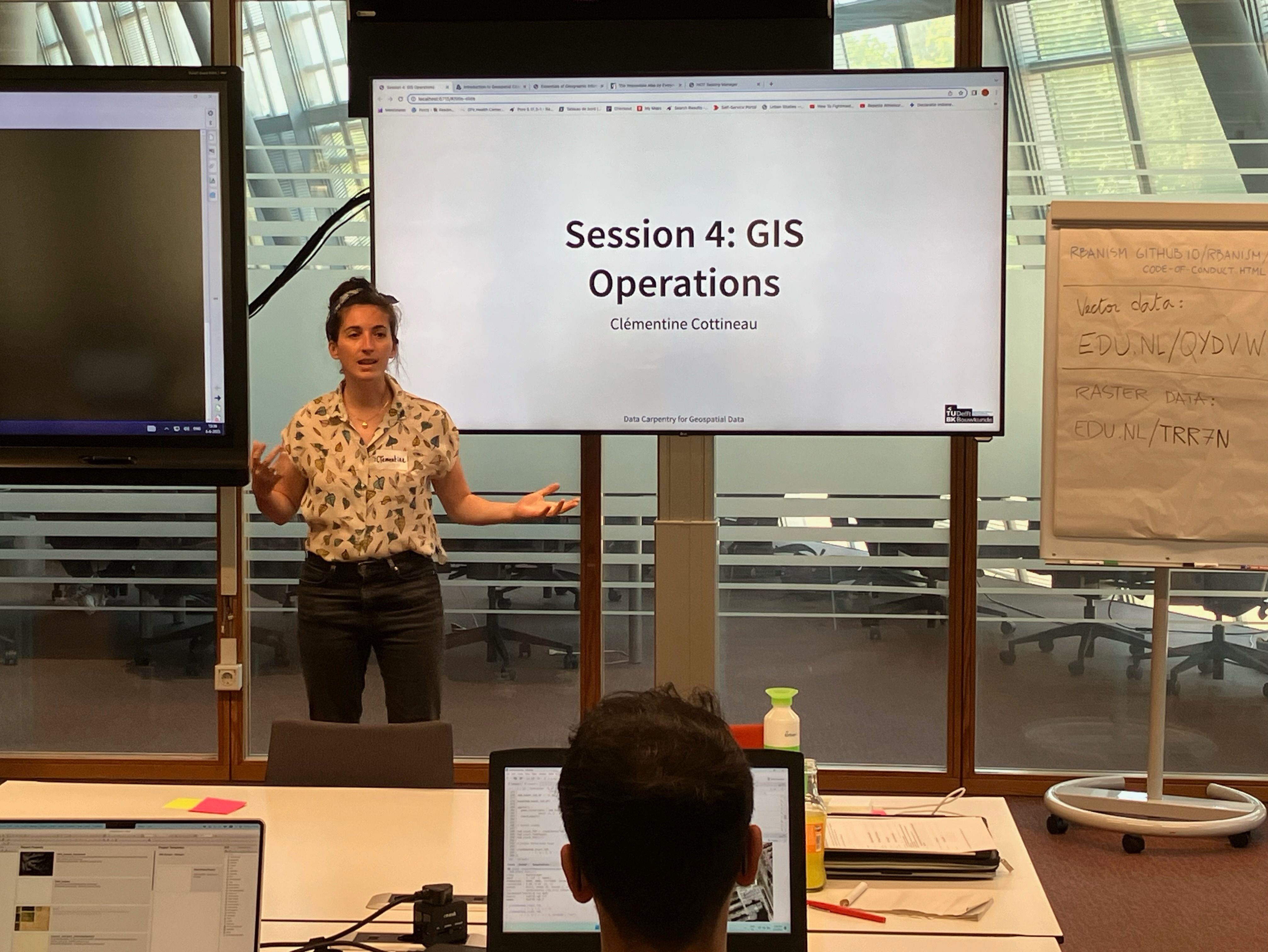A collaborative approach to digital research data training
When it comes to digital and research data skills, the TU Delft Library offers a range of training and support to help researchers conduct high-quality, reproducible, and impactful research. In collaboration with the Library, Assistant Professors Claudiu Forgaci and Clémentine Cottineau led an effort to create a workshop tailored to their field called Geospatial Data Carpentry for Urbanism (GDCU). In addition to teaching valuable skills and tools to researchers and master’s students, this project shows that collective efforts and open science practices are a benefit to the community and to the implementation of the TU Delft digital strategy.
Connecting with Data Carpentry
Some of TU Delft Library’s training for researchers involves Data Carpentry workshops, which aim to teach researchers basic concepts, skills, and tools for working with data to do more efficient and reproducible research. These workshops are done under TU Delft Library’s membership to The Carpentries, an organisation that teaches foundational coding and data science skills to researchers around the world. It was an interest in data and digital humanities that led Forgaci, an Assistant Professor of Urban Design, to help with a Data Carpentry for Social Sciences workshop at the Library. He then connected his colleague Cottineau, Assistant Professor of Urban Studies, who says their involvement got them thinking about how they could collaborate to connect this experience to questions related to the built environment.
Collective efforts and open science practices are a benefit to the community and to the implementation of the TU Delft digital strategy.
More than a workshop
Seeing a need in their faculty for proficiency in tools tailored around geospatial data, they began exploring The Carpentries’ existing content. There were some useful resources, but nothing specifically related to urbanism. “All of their curricula are open, which means we could build on existing lessons to make them domain specific,” says Forgaci. “There was great infrastructure to work with and if we would have had to start from scratch, I don’t think it would have happened.” The pair, together with a growing team of instructors and helpers, have now run three sessions of the workshop they developed and say the impact can be seen in various ways.
We really want to promote open science practices towards applications in our field.
Claudiu Forgaci
They have received very positive feedback so far, so they know the workshop content is beneficial, but it is more than that. Both Cottineau and Forgaci believe there is also value in these sorts of collaborative projects in terms of rewards and recognition and feel fortunate that management and colleagues in their department recognise their efforts and their time investment. And Cottineau says it is rewarding to see people progress from being participants in the workshop, to being helpers, and later even becoming instructors. “That to me is a really proud moment because it means they not only found it interesting, they probably learned from it, and they're willing to give back,” she says. “And that's building a collective that works which is proof that some things that we're doing are working.”
The Rbanism community has grown quite a bit over the last couple of years
Claudiu Forgaci
Open for the community
The workshop is also closely aligned with Rbanism, a community started by a group of R users in the Department of Urbanism at TU Delft that aims to empower urbanism researchers, students, educators, and practitioners to use open-source software. “We really want to promote open science practices towards applications in our field, and one of the ways in which we can do that is through this workshop,” says Forgaci. “We are constantly trying to find synergies between those activities so that we can try to do them together.” He also notes that the Rbanism community has grown quite a bit over the last couple of years, in part by bringing people into collaborative efforts such as their workshop.
Collective effort
It takes a collective effort to create something like the Geospatial Data Carpentry for Urbanism workshop. The TU Delft Library in collaboration with the TU Delft Digital Competence Centre (DCC), researchers from TU Delft Faculty of Architecture and the Built Environment, Department of Urbanism, and the Rbanism community all played a part in the process. Forgaci says that they are grateful for the support they received. “The Library has been so helpful, but also this entire network of data stewards, data managers, research software engineers, and other researchers like us being involved from other faculties who are contributing to this kind of common or shared goal of open science practices,” he says. “It's a completely different mindset in which you share something and help each other out by showing when you don't know something or sharing when you make a mistake.”
The support included everything from advice, to infrastructure, networks, and logistics, which Cottineau said enabled their project. “We were able to focus on the things that are related to content and that's really valuable,” she says. The workshop is currently being further developed in The Carpentries incubator to be tested by other teams around the world. Forgaci, Cottineau, and the team then plan to publish an article on their education material, making it available to even more people.


